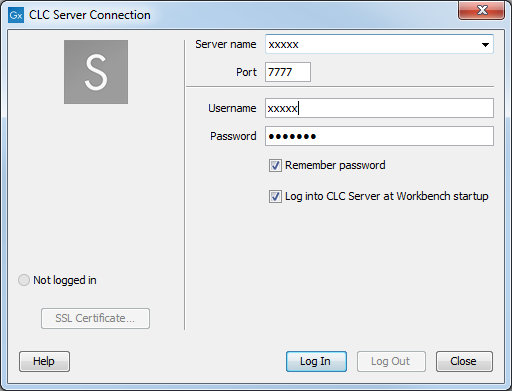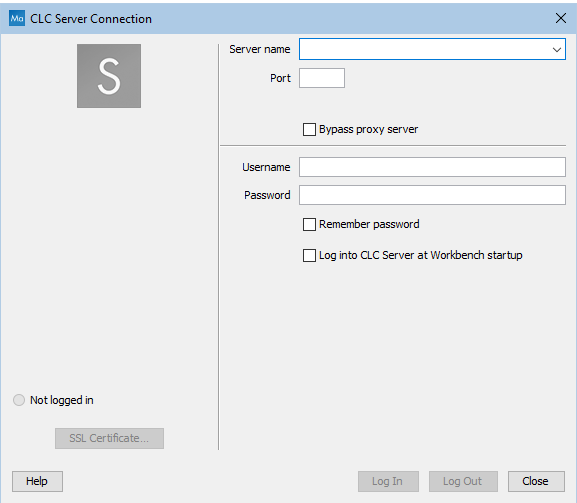CLC Server connection
Using a CLC Server, data can be stored centrally and analyses run on a central machine rather than on a personal computer. After logging into the CLC Server from a Workbench:
- Data in CLC Server locations will be listed in the Workbench Navigation Area.
- When launching analyses that can be run on the CLC Server, you will be offered the choice of running them using the Workbench or the CLC Server.
- Workflows installed on the CLC Server will be available to launch from the Toolbox.
- External applications configured and enabled on the CLC Server will be available to launch from the Toolbox, and to include in workflows.
To log into a CLC Server or to check on the status of an existing connection, go to:
File | CLC Server Connection (![]() )
)
This will bring up a login dialog as shown in figure 6.1.

Figure 6.1: The CLC Server Connection dialog.
Your server administrator should be able to provide you with the necessary details to fill in the fields. When you click on the Log In button, the Workbench will connect to the CLC Server if your credentials are accepted.
Your username and the server details will be saved between Workbench sessions. If you wish your password to be saved also, click in the box beside the Remember password box.
If you wish the Workbench to connect to the server automatically on startup, then check the box beside the option Log into CLC Server at Workbench startup. This option is only enabled when the Remember password option has been selected.
Further information about working with a CLC Server from a CLC Workbench is available in this manual:
- Launching tasks on a CLC Server is described in Running a tool on a CLC Server.
- Monitoring processes sent to the CLC Server from a CLC Workbench is described in Processes tab and Status bar.
- Viewing and working with data held on a CLC Server is described in Data structure, and deleting data held on a CLC Server is described in Delete, restore and remove elements.
- Importing data to a CLC Server and exporting data held on a CLC Server is described in CLC Server data import and export.
For those logging into the CLC Server as a user with administrative privileges, an option called Manage Server Users and Groups... will be available. This is described at http://resources.qiagenbioinformatics.com/manuals/clcserver/current/admin/index.php?manual=User_authentication_using_Workbench.html.
Bypassing proxy server settings
After proxy settings have been configured (Advanced preferences), and the CLC Genomics Workbench has been restarted, a checkbox is shown in the CLC Server Connection dialog allowing the proxy settings to be bypassed for connections to the CLC Server (figure 6.2).

Figure 6.2: Proxy settings can be bypassed when connecting to the CLC Server.
If you wish to preconfigure Workbenches to bypass the proxy settings when connecting to a CLC Server, this can be done using a proxy.properties file, where the IP address (not the host name) of the CLC Server is provided in the proxyexclude field. For further information on using properties files, see https://resources.qiagenbioinformatics.com/manuals/workbenchdeployment/current/index.php?manual=Per_computer_Workbench_information.html.
